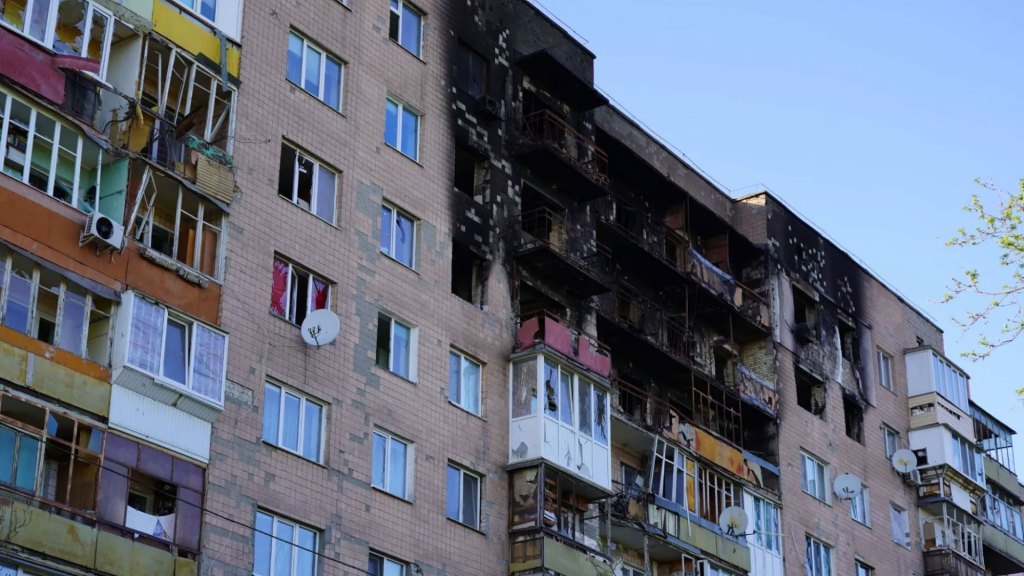
When a long line of Russian tanks rolled into Bucha, Ukraine, on March 3, 2022, the extent of the violence and horrors they were about to unleash was unimaginable. The invasion and month-long occupation was part of a larger effort to advance on Kyiv. In what would later be reported as a methodical “cleansing,” Russian soldiers killed more than 450 people, including civilians who were trying to flee the city.
On the second anniversary of the massacre, we are looking back at the award-winning journalism project The Banality of Brutality, which details the experiences of a close-knit group of neighbors through a 33-day record of their Telegram group chats. The team from OCCRP (Organized Crime and Corruption Reporting Project) was honored with the Excellence and Innovation in Visual Digital Storytelling award in the 2023 Online Journalism Awards for their exceptional delivery of these human stories.
“We started this project because we felt a deep, urgent calling to expose the horrors caused by the Russian army in the ongoing war,” said OCCRP Investigative Reporter Elena Loginova. “The full-scale invasion in Ukraine led to countless atrocities, impacting people living in places like Block 17 in Bucha. Our main goal was to give a voice to those enduring immense suffering and make sure their stories reached the global stage.”
After Russian forces withdrew from Bucha, much of the reporting focused on the massacre—the body counts, the mass graves, the signs of torture and other shocking details that emerged. But for this project, the OCCRP team zoomed in on a unique view of “everyday life” under siege—both terrifying and mundane—for 88 people in one apartment block located across the street from the Russians’ temporary military base.
Read more from Elena on how the project came together.
The project was a collaborative effort involving various roles within the OCCRP team and its Ukrainian member center, Slidstvo.Info. OCCRP Film Director Matt Sarnecki and Deputy Editor-in-Chief Julia Wallace played key roles in shaping the strategic vision to turn the Telegram chat into a compelling narrative.
The idea to use the Telegram chat logs to tell a story originated from Slidstvo.info’s Editor-in-Chief, Anna Babinets, who shared it with me. I then gathered the materials and selected the content that stood out.
The OCCRP tech, design, and web teams played a pivotal role in organizing and translating the extensive volume of messages, and they also contributed to developing the innovative scrollytelling format.
In the field, reporter Yana Korniychuk conducted interviews with many of the people involved in the chat to verify information. The story is multi-dimensional and combines a scrollable format, multilingual translation, and strategic curation. This allowed the project to go beyond traditional reporting boundaries and present the narrative in a way that captured the complexity of the situation.
First, this project highlighted the significance of agility and responsiveness when documenting and verifying war crimes in real-time. The ability to adapt quickly to changing situations is crucial in such dynamic environments. The project also shed light on the challenges of verifying information amidst the chaos of war. The door-to-door verification conducted by reporter Yana Korniychuk, who personally engaged with residents, underscored the importance of on-the-ground efforts to match individuals with messages and authenticate content. Another important takeaway is the effectiveness of collaboration and the willingness to involve professionals from diverse fields. This collaborative approach contributed to making the story more comprehensive.
The work is far from over. The ongoing war demands continued documentation of war crimes, dispelling rumors, and providing an in-depth understanding of constant human suffering because of the Russian invasion.
Almost all Ukrainian teams of investigative reporters shifted their focus to investigating war crimes committed by Russians. Given the vast amount of information, reporters are likely to delve into big data-based stories to uncover patterns and trends.
Additionally, there’s a trend towards using documentaries and multimedia formats to reach wider audiences and provide a more immersive experience. It is crucial to record this significant moment in human history with accuracy and a focused emphasis on human stories. By doing so, the reporting can offer a deeper and more nuanced understanding of the impact of war on individuals.
Our experience with the scrollable format and multi-dimensional storytelling has changed how we present stories. We’ve realized the impact of immersive and engaging storytelling, so we’re always looking for creative ways to share complex narratives. This could mean using multimedia, trying out new formats, and making sure our work is accessible to a wider audience. We stick to thorough fact-checking, even when it’s tough, and that’s something we carry into every project.
The entire team is deeply thankful for the recognition and appreciation received from respected colleagues worldwide. This award holds significance beyond professional acknowledgment; it serves as a poignant reminder of the horrors faced by the people of Ukraine. It underscores the importance of cherishing freedom and democracy to avoid descending into the abyss of tyranny.
Here are a few must-sees:
Launched in 2000, the Online Journalism Awards are the only comprehensive set of journalism prizes honoring excellence and innovation in digital journalism around the world. The call for entries for the 2024 awards will be open April 4–May 9.
Explore the 2023 winners and finalists Volunteer with the OJAsThe Online Journalism Awards™ (OJAs), launched in May 2000, are the only comprehensive set of journalism prizes honoring excellence in digital journalism around the world.

Posted By
Karolle Rabarison
Categories
Stories